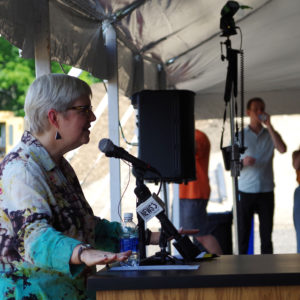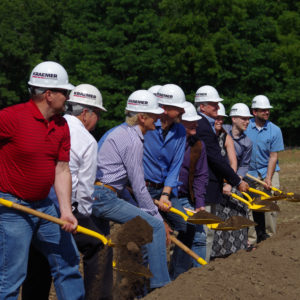“Today is certainly a great day for Promega R&D, but it is also a great day for science.”

Gary Tarpley, director of Research and Development at Promega closed his remarks for the ground breaking of the new Promega Research and Development Center in Fitchburg, WI, with those words.
With the ground breaking on this new R&D facility, Promega makes a $190 million, long-term investment in science.
But why invest in science?
There are many reasons. First, investing in science allows us to shape our own future. When we invest in learning about our world, we gain understanding. With that understanding comes an ability to shape the future. For instance, by asking the simple question “what is the sequence of the human genome”, we have developed technologies that have ushered in an age of personalized medicine. Individual tumors can be sequence and treatment tailored to their specific genotype for more effective cancer therapies. When we ask questions about how we feed ourselves sustainably on a mission to Mars, we learn new cultivation techniques that can be applied to agricultural and fisheries practices here on earth. When we ask even seemingly esoteric questions about how a sperm cell becomes specialized, we learn about the function of proteins that are conserved among species and may be important in preventing pathologies such as neurodegeneration.

Investing in science benefits society by helping find creative, thoughtful ways to solve problems. Promega scientists often collaborate with their peers around the globe, combining expertise to develop creative solutions to tough questions. These collaborations can sometimes lead to the development of new technologies that then can be used by other scientists to push their work forward, such as the collaborations around the application of the NanoBRET™ TE Assay. These same newly developed technologies can also be used to help solve pressing problems. For instance, the NanoBRET™ Kinase TE Assay is part of another partnership with UC-Davis to attempt to find a solution to the problem water scarcity in agriculture. The team at UC-Davis is hoping to identify kinase targets that might allow them to engineer drought-resistant rice strains.

Investing in science also drives the local economy, benefiting the communities where research is pursued and technology developed. For instance, Promega spends about 30 million dollars in Wisconsin on goods and services. This expenditure extends to a $600 million multiplied annual economic effect, and Promega operations are estimated to support an additional 2,840 jobs.
So this big investment in science has benefits far beyond Promega research, it benefits the local economy, it helps solve global problems, and it helps us shape our own future.
Michele Arduengo
Latest posts by Michele Arduengo (see all)
- The Casual Catalyst: Science Conversations and Cafes - July 18, 2024
- Cancer Moonshot: Solving Tough Problems - May 28, 2024
- Automated Sampling and Detection of ToBRFV: An Emerging Tomato Virus - April 25, 2024

